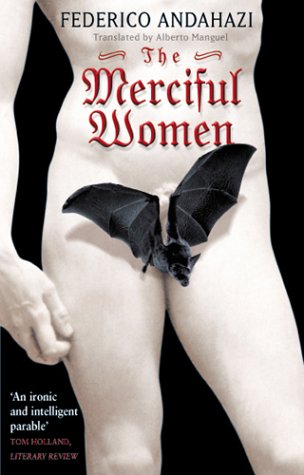
A terrifying letter delivered by an unseen hand to John William Polidori unleashes a seminal tale of lust, literature and murder in Federico Andahazi's new novel, The Merciful Women. Lord Byron, Percy Bysshe Shelley, Mary Godwin (later Shelley) and her step-sister Claire Clairmont make up the decadently inspired group assembled at the Villa Diodati in the shadow of the Alps during that famous summer of 1816 which, in Andahazi's view, "changed the course of world literature".
Byron's secretary the doctor and aspirant poet Polidori, nicknamed Pollydolly, "who bears with stoic resignation the cruellest indignities" from his contemptuous employer, accompanies the illustrious crew. Taunted and ignored by turns, this bitter and increasingly twisted sidekick to the Romantics is monstrously seduced into an opportunity for greatness and revenge by a horrendous Muse--Annette Legrand--who offers literary inspiration and genius in exchange for prosaic semen to save the lives of her insatiable sisters--the notorious Legrand twins.
In real life Polidori was indeed Byron's secretary. Described by his famous employer as "more apt to induce illnesses than to cure them" the sidelined sawbones and aspiring writer was a marginalised participant in that famous writing competition that produced Mary Shelley's Frankenstein. A few years later in 1819 Polidori gave a manuscript entitled "The Vampyre", apparently fathered on that same fateful night, to Byron's publishers. Whilst Byron indignantly denied authorship, this now classic gothic tale became an overnight runaway bestseller. The mystery of literary paternity, bastardy and possible plagiarism surrounding "The Vampyre" is the inspiration for Andahazi's fictional tale: "It is a truism to say that there is nothing as open to doubt as paternity, and yet this truth can be extended quite naturally to all literary off-spring."
This erotic roman à clef is a successful follow on to Andahazi's contentious first novel, The Anatomist, and continues his voluptuous fascination with bodily matters in a modern tale which would itself have been a worthy contender for that infamous romantic night of storytelling and ghostly invention. A witty, wicked drama about the monstrous birth of the gothic form, The Merciful Women reads at the pace of an alpine avalanche--and the twisted denouement is a cleverly uncanny ejaculation. --Rachel Holmes